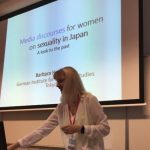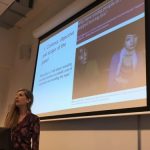Veranstaltungen und Aktivitäten
120. Geburtstag von Yasunari Kawabata
Im Jahr 2019 feiern wir den 120. Geburtstag des japanischen Literaturnobelpreisträgers Yasunari Kawabata (1899–1972).
Zu diesem Ereignis stellen die International House of Japan Library, die Bibliothèque de la Maison franco-japonaise und die Bibliothek des Deutschen Instituts für Japanstudien Werke von und über Kawabata in englischer, deutscher und französischer Sprache aus.
Autism in the Workplace – How the Diagnosis of a Developmental Disorder Affects Employment Situations in Japan
The spread of information on developmental disorders, mainly Autism Spectrum Disorder and ADHD, as well as changes in disability employment legislation have led to an increased number of diagnoses and a heightened interest in the subject of employment for individuals on the spectrum both in Japan and in the international context. Little research exists, however, on the perspective of employees on the spectrum, their actual employment situation, the opportunities and hurdles they face, and their coping strategies.
Japanese companies and employment facilities use the designation of disability to create employment structures that often differ from general employment structures in regards to work content, remuneration, or career opportunities. Based on preliminary findings from six months of participant observation in privately organized gathering spaces for persons with developmental disabilities and qualitative interviews with the participants in those spaces, this study reveals how individuals on the spectrum make use of the employment structures provided for them, or eschew them to find different ways of employment.
Environmental Local Scales: Women’s Writing in Northern Tōhoku, Present to Postwar
Public and academic interest in literature from Japan’s rural north culminated in consecutive Akutagawa Prizes awarded to Numata Shinsuke, Wakatake Chisako, and Takahashi Hiroki in 2017 and 2018. Despite mainstream success, however, the bulk of literature published by Tōhoku writers in minor or independent magazines remains unexplored.
This talk will explore women’s writing published in northern Tōhoku in the present moment and trace legacies of local print culture from the mid-1940s. It will introduce the print history of regional women’s magazines, as well as explore the fiction and essays of women writers that are rarely included in literary histories of the period. Tōhoku writers critiqued the gender politics of the postwar moment, reconfiguring what it means to scale literature to the region or the nation. Reviewing the history of rural literary production and gendered politics of democratization uncovers legacies that connect the postwar moment to our conceptualization of regional space and literary production in Japan’s peripheries today.
Speaker
Eric Siercks, University of California
Universities in the Digital Age
Japan’s and Germany’s ambitious national frameworks of Society 5.0 and Industry 4.0 acknowledge the importance of education and research as key success factors in the digital transformation. Universities are not only to develop the necessary human capital and to contribute to technological advances, they are also to play key roles with regard to social inclusion and life-long learning. To do so, they are expected to deepen and widen cross-organizational and international cooperation. Last, but not least they are urged to adjust their core activities of teaching, research and administration to take advantage of new digital technologies. How are universities in Germany and Japan responding to these challenges? How do they see themselves affected? What strategies do they pursue? Our two speakers are best suited to answer these questions based on their leading positions and professional careers in higher education and research institutions in Germany and Japan.
Speakers:
Bernd Huber, President of Ludwig-Maximilians-Universität München
Miho Funamori, Strategy Manager at the Research Center for Open Science and Data Platform at National Institute of Informatics
User-driven Innovation in Health- & Elderly Care in Japan
Japan is enthusiastic about developing and applying innovative technology in the context of health- and elderly care. Research and development in care robotics, sensor technology (mimamori sensā), or ICT applications are widely promoted by the government. Despite these manifold efforts and activities, many devices fall short of meeting the needs expressed by users. Therefore, this DIJ Forum raises the question, what is necessary to fulfil user’s needs in healthcare? What needs to be done to improve user acceptance and usability of technology regarding innovation in health- and elderly care? Our two speakers are best suited to discuss these questions from a cross-disciplinary perspective.
Speaker:
Sarah Cosentino, Waseda University
Nobu Ishiguro, Osaka University
Citizen Science in the Digital Age
– Engaging civil society in social science and humanities research –

The progress of digital technology creates new opportunities in all areas of the civil soci-ety. The expansion of citizen science is one example. With citizens taking part in re-search activities, their understanding about science deepens. At the same time, civic engagement can support and advance scientific research. Nevertheless, compared to the natural sciences, practices of citizen science in the social sciences and the humanities (SSH) are still rare.
Combining experiences and insights by leading experts from Japan and abroad, our conference will take a closer look at the opportunities and challenges for citizen science in SSH. Where and how can civil society get engaged? What are the potential benefits? What risks need to be addressed? How can respective collaborations be initiated and coordinated? How will this effect both society and research in SSH?
The Digital Transformation – Implications for the Social Sciences and the Humanities

The two-day academic workshop – jointly organized by the German Institute for Japanese Studies (DIJ), the German Centre for Research and Innovation Tokyo (DWIH Tokyo) and the Nippon Institute for Research Advancement (NIRA) – discussed the impact of DT on the social sciences and humanities with regard to three subtopics.
It first addressed the impact of DT for research questions and research design. What questions do we need to ask and how can we make best use of DT in the way we conduct research? Second, it elaborated the possible implications of DT with regard to the dissemination of research outcomes. Finally, it considered how DT might change the organization and institutional set-up of academia. Who will conduct research? Where will it be conducted? Will disciplinary boundaries remain relevant?
Das DIJ auf der diesjährigen ICAS 11
Bei der diesjährigen ICAS 11 Konferenz in Leiden war das DIJ mit drei Vorträgen präsent von Barbara Holthus, Hanno Jentzsch und Nora Kottmann. Darüberhinaus hatte die Max Weber Stiftung einen Informationsstand, auf dem das DIJ auch mit diversen Publikationen und Informationen vertreten war.
Für einen ausführlichen Bericht dazu, siehe hier.











 Open Access
Open Access 
